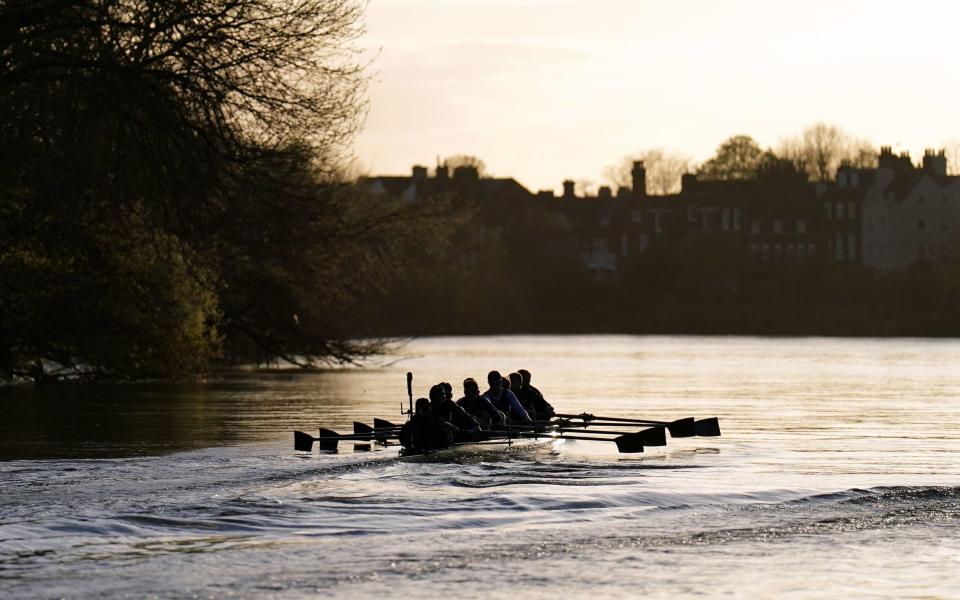Oxford’s Boat Race preparation ‘thwarted’ by flooding

If you want to know why Oxford have endured a bumpy build-up to this year’s Boat Race, ask a geography student.
The explanation comes down to flood plains and river catchments. Thanks to the soggy weather of the past six months, Oxford have been unable to train at their Wallingford headquarters.
Meanwhile Cambridge have been paddling away as normal. Not only is East Anglia relatively dry, with rainfall limited to around half the national average, but the River Great Ouse, which runs through Cambridge’s training base at Ely, has been carefully tamed to prevent flooding.
Asked on Wednesday about the discrepancy between the two universities, Oxford rower Harry Glenister agreed that “The weather has been pretty terrible this year.
“Cambridge think that’s a disadvantage for us,” Glenister added. “Because Cambridge can row on any conditions. At Wallingford we can’t actually row so we had to go to Caversham.”
Caversham, a quiet suburb of Reading, is the base of British Rowing, who built the Redgrave Pinsent Rowing Lake there in 2006. It takes just over an hour to drive to the lake from Oxford, rather than the 30 or 40 minutes required to get to Wallingford.
“I wouldn’t say it’s not a problem,” Oxford coach Sean Bowden told Telegraph Sport. “It’s another hour on the bus per day, so that’s time that puts them [the crew] under pressure for studying, recovery.
“This has been one of the two or three really bad years,” added Bowden, who has been involved in the Boat Race in a variety of roles since he first rowed for Cambridge in 1993. “I mean the [Wallingford] boathouse was a metre deep in water, so you couldn’t [row there]. Caversham was also flooded. And then Caversham, when it became unflooded, then froze.
“So yeah, it did feel at times like you were always being thwarted.”
At this point, some of us might wonder whether Oxford aren’t being a little precious. What’s wrong with a bit of flooding, anyway? Can’t they just put on their dark blue wellies and get on with it?
But the Thames becomes wild when it rises. England’s most iconic river has a massive catchment area of 4,640 square kilometres. After a couple of wet days, it picks up speed and starts barreling along its valley with unnerving power.
As Bowden told Telegraph Sport, “You would rather not be rowing on a flooded river with the stream screaming around the corners and twisting the boat around.”
This is unlikely to be a one-off. If you lump rainfall data into 30-year chunks, the national average has risen from 247mm for 1831-60 (the first available period) to 347mm for 1991-2020.
This is climate change in action. Higher temperatures lead to more evaporation from the sea. Extra water in the atmosphere drives rainfall. Oxford’s No 6, Annie Sharp, a geography graduate now pursuing an MsC in water science, could no doubt explain this cycle better.
But flooding is not the only threat to the Boat Race’s future. The same incessant rain that inundated Wallingford is also partly responsible for the alarming river pollution figures released on Tuesday. Even if our water companies agree to build more processing plants, it will always be difficult to prevent heavy downpours from flushing sewage out of drains and into natural watercourses.
This year, the traditional cox-dunking victory ceremony stands in doubt because of unacceptable E Coli levels in the Thames. Testing carried out at Hammersmith Bridge by the pressure group River Action found almost 3,000 E coli colony forming units (CFU) per 100ml of water, whereas the recommended limit is only 1,000.
No wonder British Rowing recently issued new and strengthened guidelines, in which they encouraged athletes to cover any cuts or grazes, clean equipment thoroughly, and wear suitable footwear.
“It’s probably the way things are going, isn’t it?” said Bowden, when asked whether he expected climate change to continue disrupting the Boat Race. “It’s probably the reality.
“But I do think the guys, they just get on with it. They don’t want to see these problems. It’s the coach’s job to do the worrying.”

 Yahoo Sport
Yahoo Sport 





































